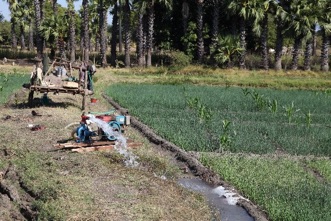News
3 April 2015
Researchers show that organic agriculture generates more economic value than conventional agriculture
Agriculture plays a central role in our environment: it can both contribute positively to it, as it can contribute to its degradation. Whereas agriculture has a fundamental role in our lives by producing large amounts of marketed goods (both food and non-food) that are valued through market mechanisms, is also often criticized for its negative impact on our environment (soil erosion, degradation and pollution, over-utilisation of water, pollution of water and air, reduction of biodiversity, etc.) that is not valued through market mechanisms (externalities). This has been well recognized by the Millennium Ecosystem Assessment published in 2005.
The tremendous increase in grain production observed since World War II has been based on the use of improved hybrid seeds, large amounts of synthetic chemical fertiliser and pesticides. It is now well proven that chemical fertiliser and pesticides have had a huge negative impact on our environment and health.

A group of researchers from Australia, Denmark, New Zealand, the UK and the USA, recently conducted a study to measure the significance of the non-traded value of biological control of pests and nitrogen mineralisation that characterise organic agriculture. This study was conducted on four crops : peas, beans, barley and wheat.
Biological control of pests - instead of using pesticides to destroy pests - uses the ecosystem services provided by natural predators, parasitoids, bacteria and fungi. In organic farming, instead of using chemical fertiliser to provide needed Nitrogen to plants, Nitrogen is obtained through the decomposition of plant residues by invertebrates and microorganisms living in the soil.
The result of the study is quite impressive and shows that the total economic value of organic farming systems analysed, including both market and non-market goods and services produced, was significantly higher than that of corresponding conventional farming systems.
Organic farming systems do not use any synthetic inputs such as chemical fertiliser and pesticide but emphasize instead building up the soil with compost and animal and green manure, managing pests through the use of ecosystem services, crop rotations, crops and livestock diversification, and enhancing functional biodiversity. Conventional agriculture typically makes extensive use of synthetic inputs, relies heavily on mono-cropping and consumes large amounts of energy and water.
Whereas organic farming systems analysed provided sometimes similar and generally less outputs of energy and crop dry matter than corresponding conventional agriculture, their total economic value was systematically higher, when both marketed goods and services and non-market ecosystems services were added.
The table below shows the breakdown of this economic value per hectare and per year for the four crops analysed in the study (for more details refer to the study report).

The balance in favour of organic agriculture is particularly important in the case of wheat.
By extrapolating roughly these results to the global temperate cropping area, the authors found ‘‘that the extrapolated net value of the these two services provided by non-traded species could exceed the combined current global costs of pesticide and fertiliser inputs, even if utilised on only 10% of the global arable area’’.
These results obviously give good reasons to develop organic agriculture and put in place measures that would contribute to make it replace progressively - and as fast as possible - conventional agriculture.
They also add arguments in favor of subsidy-tax measures that would help to internalize positive and negative externalities and provide incentives to both producers and consumers to go for organic products. The additional non-market value of organic agriculture could be internalized through an equivalent subsidy on organic products or a tax on the corresponding conventional products. Experience has shown that this type of subsidy-tax system can work [read more]. Unfortunately, for the time being, the incentive system prevailing in almost all countries in the world is more supportive to conventional agriculture than to organic, particularly through subsidies provided to chemical inputs. [read more] Even the recent so-called greening of the EU Common Agriculture Policy did not do much to reorient these incentives in favor of a more sustainable agricultural production.
—————————
Further readings:
-
-Sandhu, H. et al., Significance and value of non-traded ecosystem services on farmland, PeerJ, 2015
-
-Price policies can help promote healthier diets: the example of Europe, Hungerexplained.org, 2015
Last update: April 2015
For your comments and reactions: hungerexpl@gmail.com




